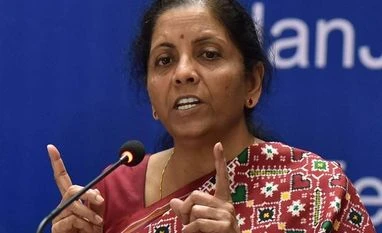FRDI was withdrawn in August 2018 after a backlash on a clause that put the onus on depositors to ‘bail in’, in case of bank failure. Considering that the deposit insurance cover was only Rs 1 lakh at the time, the Bill led to a huge outcry as it said deposits could be used to nurse a failing bank back to health.
In the recent Budget, the government increased deposit insurance cover to Rs 5 lakh. Besides, insolvency laws were also tweaked to accommodate financial institutions.
“It (FRDI Bill) was once introduced and withdrawn for some reasons. We have started to work on it again. I don’t know when I will introduce it,” the finance minister said.
Sitharaman said meeting depositors of PMC Bank during her last visit to Mumbai was “heart-wrenching”.
However, she did not clarify if the increased deposit insurance cover would apply to PMC Bank depositors as the proposal hadn’t been passed by Parliament.
Sitharaman was in Mumbai with finance ministry secretaries as part of the government’s outreach efforts on the Budget. The team will visit other cities, including Chennai on Saturday and Kolkata on Sunday to answer queries on the Budget. In Mumbai, Sitharaman and her team met social workers, scholars, academicians, economists, fund managers and journalists.
Sitharaman said she will assess how her new personal tax scheme will be accepted by the people, and she will take a call on whether exemptions should be discontinued altogether based on that. In the Budget, the finance minister created a personal income tax structure with two options, one without exemptions but at a lower tax rate, and another with exemptions and the existing tax rates.
“Eventually, we want to have an income tax framework for India, which will be simple. The rates will come down to the minimum, which will help people to comply. I am not forcing anybody, I am giving an alternative. We will see this year, how many will be comfortable to move here, through the year understand it, and based on that we can move further,” Sitharaman said.
Defending the tax structure, Sitharaman said in another session earlier in the day that last year when the government offered a similar tax structure to Indian companies, 90 per cent accepted lower tax rate bereft of any exemption. The minister expressed concerns that while the government wanted to lower income tax rate, the exemptions wouldn’t allow that. The government now hopes that 80 per cent of individual taxpayers would move to the new regime. The government ran a simulation of 578,000 returns that showed that 69 per cent of taxpayers would be better off under the new regime, while 11 per cent wouldn’t be impacted. The government expects the latter group to accept the new regime as it would help them.
According to the finance minister, the government doesn’t want to dictate to people about where they should save. The choice should be of taxpayers themselves, Sitharaman said.
Similarly, when in the interactive session some promoters of financial firms raised the issue of high dividend distribution tax, the finance minister defended her stance in letting the dividend tax be assessed in the hands of the receivers and not the company, as that would help the middle class pay lower taxes. However, the high income group need to pay about 43.5 per cent tax on an instrument that has been distributed to them after the company paid its taxes to the government already, the promoters argued.
On LTCG
Under criticism for not abolishing the long term capital gains tax (LTCG), Finance Minister Nirmala Sitharaman on Friday said her ministry will wait for one "normal year" before taking a call on the cess.
To read the full story, Subscribe Now at just Rs 249 a month
Already a subscriber? Log in
Subscribe To BS Premium
₹249
Renews automatically
₹1699₹1999
Opt for auto renewal and save Rs. 300 Renews automatically
₹1999
What you get on BS Premium?
-
Unlock 30+ premium stories daily hand-picked by our editors, across devices on browser and app.
-
Pick your 5 favourite companies, get a daily email with all news updates on them.
Full access to our intuitive epaper - clip, save, share articles from any device; newspaper archives from 2006.
Preferential invites to Business Standard events.
Curated newsletters on markets, personal finance, policy & politics, start-ups, technology, and more.
Need More Information - write to us at assist@bsmail.in
)